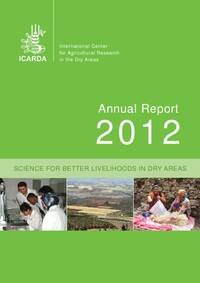ICARDA Annual Report 2012

Authors:
For ICARDA, 2012 has been a time of change and evolution. We have been busy tackling the many issues of dryland agriculture and global food production against a backdrop of focusing our efforts as a force for change for people living in the world's drylands and our areas of scientific expertise.
The increased unpredictability of temperature extremes and extended droughts has the most severe impact on those living in dry areas and on marginal lands. ICARDA, with its expertise in an integrated agro-ecosystems approach to dealing with such challenges, which we have developed over the years with partner countries, is particularly well-placed today to provide effective and practical solutions for the challenges facing dry areas.
The world of research for development is evolving rapidly, as is the CGIAR Consortium, of which ICARDA is a member. In 2012, ICARDA made significant progress as the leader of the CGIAR Research Program on Dryland Systems. In the program's inception phase a broad range of partners came together to set research priorities and conduct detailed site characterizations in five target regions – extending from Central Asia to West Asia, and North and sub-Saharan Africa. The program is set for full funding and implementation in early 2013. ICARDA is active in ten other CGIAR Research programs – jointly with the International Maize and Wheat Improvement Center (CIMMYT) in the Wheat Program, and as a partner in nine others.
The conceptual approach of the Dryland Systems Program grows out of the experience and research accomplishments
achieved over the past decades by many organizations and science programs, including CGIAR and its many national
partners. ICARDA brings unique expertise to the Program – through its 35 years' experience in refining integrated agroecosystems approaches with more than 40 dryland countries – to develop improved crop varieties, effective water and land management practices, integrated crop-livestock production systems, and institutional and policy options.
This year, we are pleased to report progress in linking research innovations to results in farmers' fields in a number of areas. These research-for-development initiatives are testing technology and policy packages with farmers in their production situations. For example, in sub-Saharan Africa ICARDA leads the wheat component of the regional initiative on Support to Agricultural Research for Development of Strategic Crops in Africa (SARD-SC). The overall program is led by the
International Institute of Tropical Agriculture (IITA), with the Africa Rice Center and International Food Policy Research
Institute (IFPRI), and funded by the African Development Bank.
The project, Enhancing Food Security in Arab Countries, has helped increase wheat yields by 25% in project sites in Egypt,
Jordan, Morocco, Sudan, Syria, Tunisia, and Yemen. It has also introduced new technologies to some 6000 farmers through
farmer field schools and travelling workshops.
In the tripartite India–Morocco–ICARDA Food Legumes Initiative, ICARDA facilitates the testing and sharing of practices and new varieties between these regions. A further notable innovation is the introduction of lentil during fallow periods of rice cultivation in West Bengal. This innovation for the region brings improved nutrition, new income-generating products, better soil health, and a new crop – producing up to 1.1 ton/ha of lentil, where nothing was previously produced, during these periods.
